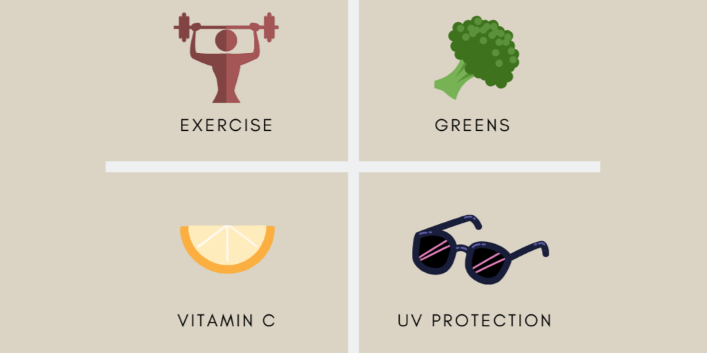
Today is World Health Day – a day to raise awareness on the importance of good health under the support of the World Health Organization (WHO). Wondering what does having good health have to do with your eye health and vision? More that you think. There are some important items to make sure to have on your plate and check off your list in order to keep your vision and eye health at top performance.
Exercise
Exercise is can reduce your chance of serious medical conditions such as high blood pressure, diabetes and high cholesterol. These conditions can affect the health of the eyes and the vision. Moderate physical exercise has been linked to a reduction in the development of glaucoma. And age-related macular degeneration risk has been found to be lower in those who exercised three times a week than people who didn’t. Don’t think you don’t have to be a marathon runner to get the benefits from exercise - climbing the stairs or taking a long walk can keep you fit and healthy.
Eating Your Greens
Everyone knows you should eat your veg but when it comes to eyes, make sure to eat your green veg! Vegetables like spinach and broccoli are rich in anti-oxidants called lutein and zeaxanthin. Our bodies cannot naturally make these nutrients that it needs so it is important to get it from your diet. Lutein and zeaxanthin help to protect and maintain healthy cells in your eyes - reducing your risk of chronic eye disease including age-related macular degeneration and cataracts.
Vitamin C
Found in fruits and vegetables, vitamin C has some positive effects on the eyes. Vitamin C intake may reduce your risk of cataracts. And when in combinations with other vitamins, it can help to reduce your risk for developing age-related macular degeneration. Vitamin C is needed to make collagen used in keeping the eye structures in their best shape.
UV Protection
Just like you protect your skin from the sun, you need to protect your eyes from the UV. Excess UV can cause cause burns to the surface of the eyes, cataracts, macular degeneration and cancer. Just because your glasses are tinted doesn’t mean they are giving you the best UV protection. Make sure your sunnies say UVA/UVB or UV400. Remember even your clear spectacles have good UV protection.







